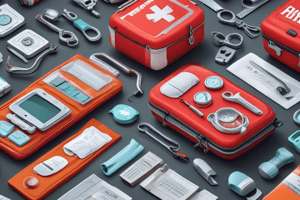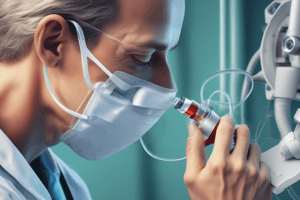Podcast
Questions and Answers
You find a 23-year-old male unconscious and not breathing after a drug overdose. What should your first intervention be?
You find a 23-year-old male unconscious and not breathing after a drug overdose. What should your first intervention be?
- Administer naloxone
- Begin chest compressions
- Open the airway (correct)
- Check for a pulse
A 7-year-old boy is choking and unable to breathe. He is turning blue and making high-pitched sounds. What is the most appropriate action?
A 7-year-old boy is choking and unable to breathe. He is turning blue and making high-pitched sounds. What is the most appropriate action?
- Administer abdominal thrusts (correct)
- Begin chest compressions
- Assist ventilations with a BVM
- Perform back blows
An 80-year-old male with COPD presents with severe respiratory distress. His SpO2 is 84% on room air. What is your first step?
An 80-year-old male with COPD presents with severe respiratory distress. His SpO2 is 84% on room air. What is your first step?
- Provide high-flow oxygen (correct)
- Check for cyanosis
- Administer a bronchodilator
- Assist with a nebulizer
A 56-year-old male is complaining of chest pain radiating to his left arm. His pulse is 100, BP is 88/50, and he is diaphoretic. What is the best next step?
A 56-year-old male is complaining of chest pain radiating to his left arm. His pulse is 100, BP is 88/50, and he is diaphoretic. What is the best next step?
A 65-year-old female with a history of hypertension complains of chest pain that began while resting. What is your first action?
A 65-year-old female with a history of hypertension complains of chest pain that began while resting. What is your first action?
An unresponsive 50-year-old male has no pulse. CPR is initiated, and an AED is applied. The AED advises a shock. What is your next action?
An unresponsive 50-year-old male has no pulse. CPR is initiated, and an AED is applied. The AED advises a shock. What is your next action?
A 22-year-old female presents with confusion, tachycardia, and dry skin. Her roommate states she has type 1 diabetes but missed her insulin dose. What is the most likely cause?
A 22-year-old female presents with confusion, tachycardia, and dry skin. Her roommate states she has type 1 diabetes but missed her insulin dose. What is the most likely cause?
A 35-year-old male is stung by a bee and is now experiencing difficulty breathing, hives, and swelling of the face. What should you do first?
A 35-year-old male is stung by a bee and is now experiencing difficulty breathing, hives, and swelling of the face. What should you do first?
A 70-year-old male is weak, confused, and complains of a sudden severe headache. He has a history of hypertension. His speech is slurred. What is the most likely cause?
A 70-year-old male is weak, confused, and complains of a sudden severe headache. He has a history of hypertension. His speech is slurred. What is the most likely cause?
You respond to a 30-year-old male with a suspected heroin overdose. He is unconscious but breathing at 6 breaths per minute. What is your first action?
You respond to a 30-year-old male with a suspected heroin overdose. He is unconscious but breathing at 6 breaths per minute. What is your first action?
A 25-year-old male is found after falling off a ladder, approximately 15 feet. He is awake but complaining of severe back pain. What should you do first?
A 25-year-old male is found after falling off a ladder, approximately 15 feet. He is awake but complaining of severe back pain. What should you do first?
A 19-year-old male has a gunshot wound to the chest and is struggling to breathe. You notice bubbling at the wound site. What is the most appropriate intervention?
A 19-year-old male has a gunshot wound to the chest and is struggling to breathe. You notice bubbling at the wound site. What is the most appropriate intervention?
A 28-year-old female was in a car accident and complains of neck and back pain. She is alert and oriented, but her vehicle has significant damage. What is the next best step?
A 28-year-old female was in a car accident and complains of neck and back pain. She is alert and oriented, but her vehicle has significant damage. What is the next best step?
A construction worker fell and has an open tibia fracture with significant bleeding. What is the first thing you should do?
A construction worker fell and has an open tibia fracture with significant bleeding. What is the first thing you should do?
A 45-year-old male is involved in a motorcycle crash and has severe bleeding from a partially amputated leg. What is your first action?
A 45-year-old male is involved in a motorcycle crash and has severe bleeding from a partially amputated leg. What is your first action?
Flashcards are hidden until you start studying
Study Notes
Airway & Breathing
- An unconscious patient who is not breathing requires immediate airway management.
- Choking patients, especially those with high-pitched sounds and cyanosis, require abdominal thrusts to dislodge the object.
- Patients with COPD and low SpO2 (84% on room air) should receive high-flow oxygen.
Cardiology
- Chest pain radiating to the left arm with a rapid pulse (100), low blood pressure (88/50), and diaphoresis are signs of a possible heart attack. Rapid transport is essential.
- Patients with chest pain, especially those with a history of hypertension, should receive oxygen immediately.
- If an AED indicates a shockable rhythm in a patient without a pulse, deliver the shock immediately following CPR initiation.
Medical
- Confusion, tachycardia, and dry skin in a diabetic patient who has missed their insulin dose are indicative of hyperglycemia.
- Difficulty breathing, hives, and facial swelling following a bee sting are signs of anaphylaxis, requiring immediate administration of an epinephrine auto-injector.
- Sudden severe headache, weakness, confusion, and slurred speech, especially in a patient with a history of hypertension, suggest a possible stroke.
- An unconscious patient with a respiratory rate of 6 breaths per minute should receive assisted ventilation with a BVM.
Trauma
- Suspected spinal injuries should be managed with immediate cervical spine stabilization (manual or with a cervical collar).
- An open chest wound with bubbling indicates a tension pneumothorax, requiring an occlusive dressing, a type of dressing used to create a seal that prevents air from entering the chest cavity.
- Patients with neck and back pain following a car accident should be carefully removed from the vehicle while maintaining cervical spine stabilization.
- Bleeding from an open tibia fracture should be controlled with direct pressure first, before splinting the fracture.
- Massive bleeding from a partially amputated leg requires immediate tourniquet application.
Studying That Suits You
Use AI to generate personalized quizzes and flashcards to suit your learning preferences.




